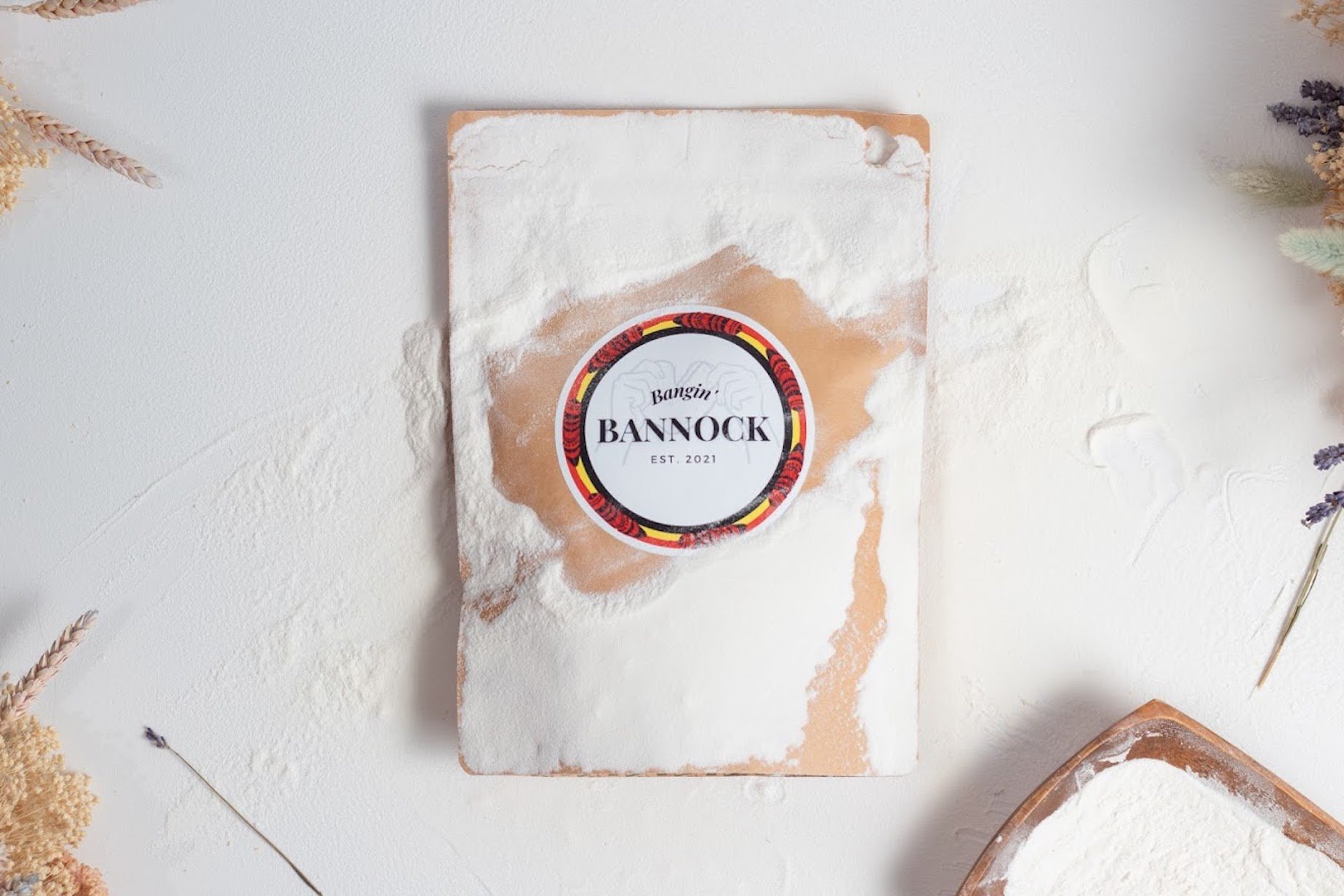“Indigenous families are big. Lots of aunties and uncles, and even more cousins. Every time I go back home or speak with my auntie, I learn of more family that I’ve yet to meet,” Destiny Hoostie, Bangin’ Bannock co-founder, tells me.
Destiny and her business partner––Kelsey Coutts, the other Bangin’ Bannock co-founder––reminisce about their bustling childhood family get-togethers: busy events full of people, connection, and food. Particularly bannock, a variety of grain-based quick bread, usually fried or baked. It’s a staple at Indigenous powwows, festivals, and family functions.
For Kelsey and Destiny, bannock is a source of nostalgia; a familiar symbol of home and the warm fuzzy associations that come with it––safety, comfort, community, and good times. As adults, they didn’t have an exact bannock recipe to replicate the childhood favorite in their own kitchens. “Everyone had a special way of making bannock, and the recipes were typically guesstimates,” says Kelsey. It seemed like the tradition of making bannock was being lost. Less people were cooking bannock, and a lot more didn’t know how.
Enter Bangin’ Bannock: a convenient bannock dry mix by the bag, Kelsey and Destiny’s solution to getting more people to cook the traditional staple. Just add water and oil!

More than what meets the taste buds
For the two Indigenous founders, incorporating Indigenous values into Bangin’ Bannock’s business model is a no-brainer.
“It will never be about the flour mix and the bag,” Kelsey says. Yes, the mix tastes delicious (I may or may not have eaten a whole bag of bannock in one day when I first tried it…), but Kelsey and Destiny think of it as more than a kitchen staple or revenue stream. For them, it’s “a resource to create conversation, connection, and community”—Indigenous values that trace back millennia.
Destiny vividly remembers one of her first sales: to a foster mom who purchased the product to connect her Indigenous foster kids with their roots in any way she could. Destiny dropped off the local order in person so she could have a conversation with the foster mom and connect her with local organizations where the children can learn Indigenous languages.
For Destiny, that simple act, sparked by a Bangin’ Bannock product, is a symbol of wealth. In Indigenous culture, passing on knowledge in the form of teaching, community, and resources is a type of currency––one that cannot be quantified by dollar signs and balance sheets.
“Culturally, if you lived in a village with other people and your neighbor didn’t have a blanket or fish, you’d share what you have and make sure they’re eating,” she explains.
The world could use more Indigenous business
Tracy Ridler, Indigenous Entrepreneurship Program Manager at Shopify, not only understands Kelsey and Destiny’s worldview on running a business; she advocates for it.
“How we define wealth in Indigenous culture is different from the conventional way the world defines wealth,” Tracy says. For the majority of us, wealth is synonymous with money and capital. Within the context of Indigenous culture, it’s viewed with reciprocity at the core. It’s about propping up each other with knowledge, community support, teachings, and storytelling. “Indigenous people are a collective. We thrive when we’re together,” Tracy adds.
As new entrepreneurs, it’s not lost on Kelsey and Destiny how aggressive and dominating business can be. “The current way we do business doesn’t bring people together. It’s dog-eat-dog out there. It doesn’t have to be like that,” Kelsey adds. “We don’t need to rule the world. There’s enough world out there. We can share.”
“We don’t need to rule the world. There’s enough world out there. We can share.”
When I asked the duo about their future aspirations, Destiny mentioned wanting to mentor other entrepreneurs and guide them along their business journey. “Not necessarily with money, but in other ways like connection and community,” she clarifies.
Indigenizing commerce as a business principle
Strangers until February 2020, Kelsey and Destiny met at 3C Challenge, a 45-day entrepreneurship program aimed at inspiring entrepreneurship within Indigenous communities in British Columbia, Canada.
With the help of community business mentors, Kelsey and Destiny were challenged with bringing a business idea to market in 40 days––from idea generation to creating a business plan, product creation, and marketing. Though they were randomly paired for the challenge, they quickly grew a bond. They now joke that they talk to each other every day more than they do with their partners.

Aptly named, the 3 C’s in 3C stand for community, culture, and cash. What sets the program apart from other early-stage entrepreneurship incubators is its focus on Indigenizing business practices. This means not measuring wealth by the accumulation of money. It means putting shared value ahead of individualism, and existing in a reciprocal relationship with the land and its communities.
When the COVID-19 pandemic hit towards the beginning of Kelsey and Destiny’s 3C cohort, the program was looking to evolve for a more digital world. The non-profit has since partnered with Shopify to build out its ecommerce curriculum.
Shopify’s commitment to Indigenous business
For Tracy and the rest of Shopify’s Indigenous Entrepreneurship program, making commerce more accessible for Indigenous people across the world is a priority. The team does this in ways closely aligned with Indigenous values: by bringing together community and redistributing knowledge and resources. This shows up through sponsorships, building business resources, community events, and free business consultations.
Back to bannock
For National Indigenous History Month in Canada (June), Destiny and Kelsey joined us at Shopify to lead a bannock cookalong, where a group of employees learned how to cook bannock in real-time on a video call. It was admittedly my first time cooking bannock (though definitely not my last).
I couldn’t help but reflect on how that cooking experience in itself was an act of reciprocity. In its simplest form, it was Kelsey and Destiny passing on their knowledge and bringing together tens of people across Shopify for a shared community experience.
For the bannock newbies like myself, bannock is a choose your own adventure type of food. At one point, I had it with butter and jam, and later I paired it as a side with a savory chicken stew. I’m now on the hunt for bannock tacos, a modern Mexican-fusion bannock adaptation that has become a staple in the powwow trail.
After our cookalong, Kelsey, Destiny, and I sat down to talk about bannock. I wasn’t expecting our conversation to end up expanding my worldview, but oh am I am glad it did. Talking to them was as enriching as the bannock itself, and these learnings will stay with me far after my bannock stores have depleted.


